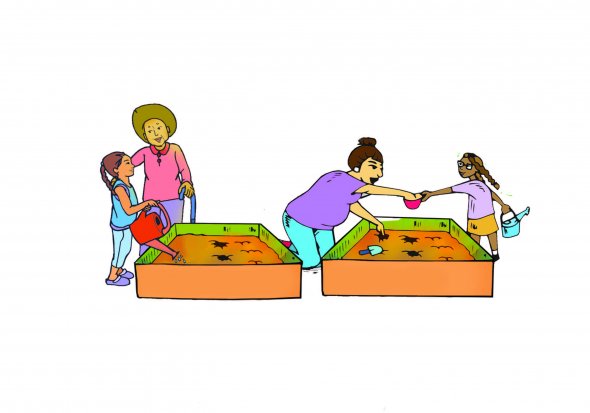
Build Authentic Relationships
Relationship equals social capital. Every positive interaction is a deposit into a “trust bank.”
Tip: Remember that an angry parent is an engaged parent.
What is this best practice area? Link to this section
Building authentic relationships is the foundation for strong and effective school-family partnership. It is important that we are always “building” towards authentic relationships with other families and school staff, as they take consistent time and effort, self-reflection, trust, and two-way communication.
In a partnership, both parties have a common interest and goal. They also have mutual respect for each other, as both parties have important and essential information to bring to the table. As in any relationship, it takes consistent time and effort to develop a partnership. This effort will look different for each and every family, and there is no right or wrong way for families to show up in a partnership.
Make This Best Practice Area Come to Life Link to this section
1. Introduce Yourself and Your Family to Your Child's Teacher Link to this section
2. Maintain Consistent Communication with Your Child's Teacher Link to this section
3. Don't Hesitate to Ask for What You & Your Child Need! Link to this section
Introduce Yourself and Your Family to Your Child's Teacher Link to this section
Introduce not only yourself, but also your child to their new teachers. This is a great way to let your child's teacher know what your child likes or doesn’t like, what their interests are, what you love the most about them, and what you are doing to support them.
You'll also want to make sure you give your child’s teacher(s) the best way and times to contact you, and make sure you know the best way and times to contact them.
- Introduction Letter (ENGLISH)
- More languages coming soon!
Maintain Consistent Communication with Your Child's Teacher Link to this section
Frequent communication with your child’s teachers will help build stronger relationships. It is important to speak with your child's teacher even when things are going well with your child. If eventually there are any problems, it is easier to work them out if you already have a relationship with the teacher.
It is also important to let teachers know about big events in your children's lives. This includes a death or serious illness in the family, divorce or separation, job loss, or reduced income. These events can affect your child’s behavior in school and their ability to learn. Knowing about these big events helps teachers understand behavior changes and provide support.
Use this link to find six suggested ways to proactively communicate with your child’s teachers when things are going well with your child.
Don't Hesitate to Ask for What You & Your Child Need! Link to this section
It is important to let your child's teacher and school know if you or your child have specific needs (e.g. language support, special education support, additional academic support, etc.). For example, if you know your child might need additional time on a test because they know the content but read at a slower pace, let your child's teacher know, and ask what they can do to support that need.
Similarly, don’t hesitate to ask for a language interpreter and/or a cultural guide if you need them. This will help to proactively create relationship and prevent any misunderstandings stemming from cultural differences. Ask your child's teacher or school site administrator what they can do, or what resources they know of, to support this need.
Other District Resources Link to this section
If you have already reached out to your child's teacher and school, and you still need language interpretation, please visit the following page to request free translation and interpretation services.
This page was last updated on February 27, 2024

